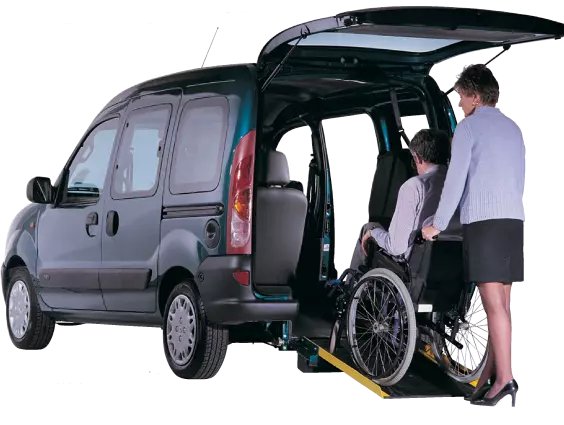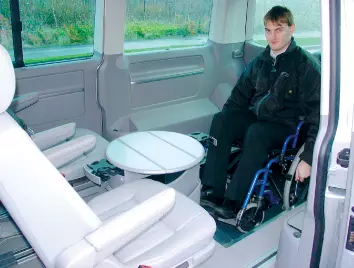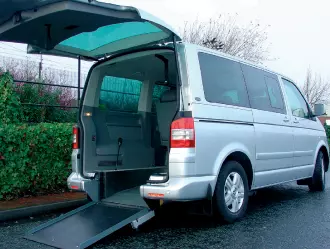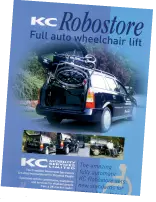|

|
If the chair fits . . .
Patrick McDonnell surveys the vehicles you might choose if you are planning to travel in your wheelchair.

We have come a very long way from the ubiquitous Trike, the vehicle that granted transport freedom to those who would otherwise be isolated or mobile only via the mercies of local authority provision. Yet even though the Trike gave disabled people a then-unprecedented
freedom of movement, this was transportation exclusively for the disabled driver alone, and excluded other members of their family.
The Motability scheme has, to some extent, levelled the playing field. It narrowed the gap in choices available to ablebodied and disabled people. The selection of vehicles now on offer are vast and varied. These range from converting hatchbacks and estate cars for use by disabled people, through mini-people carriers, to taxis and 20-seat mini-buses. The Department for Transport lists 39 conversion manufacturers on its website. 
KC Mobility Services offers a series of solutions to the transportation of disabled people, from specialised seating systems to the transport of manual and powered wheelchairs in essentially standard cars. For example, KC markets its Turny power swivel seat, designed to allow fast-action, easy entry and exit for higher floored vehicles such as 4X4s, MPVs and vans. KC also offers sixway and swing out seats, seat rising to standing, and motor home access seating.
For the transport of manualpowered wheelchairs KC offers the Robostore fully automatic wheelchair lift. The device, which folds into the space of a standard estate car, opens the rear door, lifts out the chair to the driver's door, positions it exactly for your transfer, and then goes back into the vehicle. The operation is performed in reverse on the driver's return.
For power-wheelchair or even heavy scooter users, KC Mobility Services offers a solution with its wheelchair hoist, capable of lifting 175kg/385lbs to a height of 91.5cm/36ins. It is available in a
fully automatic mode to give independence to those who have difficulty in storing and unloading wheelchairs from vehicles. 
In the mini people-mover conversion sector of the market, eight manufacturers offer choice in the 1.2 to 2.0-litre end of the market, catering for up to four passengers plus wheelchair.
Vehicles in this sector include the Renault Kangoo, Citroen's Berlingo and the Suzuki Life. Brotherwood Automobility, Constables Mobility, Gowrings Mobility, Versa – unique to
Widnes Car Centre – and Gleneagles Conversions offer the Kangoo, with Brotherwood supplying the Berlingo.
Nine companies in the UK convert Kangoos for wheelchair conveyance. The four- or five-door Kangoo can, depending on specification, be fitted with a number of seat combinations and wheel chair loading options and can be supplied with automatic transmission.
There is a cornucopia of people-carrier, mini-van and bus wheelchair conversions on the market from vehicle manufacturers spanning the alphabet from Chrysler to Volkswagen.
People carrier conversions include Chrysler's Voyager, Toyota's Yaris and Vauxhall's Zafira. Then there is the European grouping of Citroen, Peugeot and Fiat, who have developed a joint template people carrier variously configured as the Citroen C8, Peugeot 807 and Fiat Ulysses. Depending on the specification, these vehicles can feature ramps, electric winches, wheelchair tracking, with wheelchair anchorage and wheelchair seatbelt options.
The choice is almost overwhelming in the multi-seat minibus sector of the market; you can choose vehicles from Fiat, Ford, Nissan, Renault, Mercedes, Suzuki, Toyota, Vauxhall and
Volkswagen. There are conversion companies specialising in different makers, including:
 • Allied Vehicles which markets its Peugeot Eurobus and Renault • Allied Vehicles which markets its Peugeot Eurobus and Renault 
• Autograph conversions: 0141 336 3211.
• Brotherwood Automobility offers the Fiat Multipla, Ford Galaxy, and Volkswagen: 01935 872603.
• Constables Mobility offers its Peugeot Expert and Volkswagen Transporter among others. The company has obtained the ISO 9001:2000 accreditation as well as Low Volume Type Approval with the Vehicle Certifi cation Agency. Constables also offers the CarChair system. This
wheelchair system converts from an all-purpose wheelchair into a car seat without the inconvenience of having to remove the wheels or chassis. By using a specially designed power lift system the CarChair, along with its user, is lifted and transferred from the pavement into the front seat position of the vehicle without having to move from the wheelchair. This system can
be used with the Peugeot 807 and 307, The Ford Focus, the Renault Mégane and the BMW Mini: 01935 767574.
• KC Mobility Services also offers a variation on this technology with its its Carony transfer seat.
High quality Recaro or BEV seats with adjustable headrest, armrests and back recline are
available, as is an electric model now available: 01924 442386.
• Gleneagles Conversions offers the Renault Traffic, Ford Galaxy, Toyota Hiace among others: 01334 657722.
• Gowrings Mobility choices include the Citroen Berlingo and Dispatch and Relay, Ford's
Connect, Renault's Kangoo and Vauxhall with its Zafira: 0845 608 8020.
• Invatravel has exclusively converted the Volkswagen Caravelle for wheelchair use for the last 20 years: 01704 506608.
• Jubilee Automotive offers its Chrysler Voyager range, the Fiat Doblo, Mercedes Benz Vaneo & V-Class, Suzuki's Wagon and Life models, the Seat Alhambra, the Vauxhall Agila and the Vexel Quovis: 0121 502 2252.
• O & H Mobility offers Citroen's Berlingo, the fiat Doblo and Scudo and Renault's Kangoo, Dispatch, Trafic and Master ranges: 01484 400796.
• Versa, unique to Widnes Car Centre, offers the Mercedes Vito, Renault Kangoo, Master and Trafic ranges, also the Toyota Hiace and Volkswagen T5: 0151 420 2000.
The majority of these people carriers and mini-buses are in the 2.0 to 3.0-litre diesel engine capacity. All feature power steering, most feature ABS (anti-lock braking), some feature EBD (electronic brake distribution) and ESP (electronic stability program). Wheelchair accommodation is normally provided through ramping systems and electric winches with wheelchair anchorage points and full length low profile wheelchair tracking.
Passenger capacity can seat a mix of 20 people in seatand wheelchair mode on some models.
Many of the companies supplying converted vehicles provide additional services such as roadside recovery, warranty and insurance deals. Some companies offer free, no obligation personal home demonstrations and test-drives. Such demonstrations are extremely useful to
prospective purchasers of such vehicles, enabling the potential buyer to test the vehicle in their own local and familiar environment, and in their own time.
The choice of vehicle is yours, but to help those interested in purchasing what could be the second most expensive thing a person buys after their home, see the information box on choosing the right vehicle and company.
The opinions on the products mentioned are those of the manufacturers, and not those of Disabled Motorist magazine. 
Buying wheelchair accessible vehicles — the pros and cons
The market for vehicles adapted for wheelchair access has mushroomed to such an extent that the choice and options available to prospective purchasers is now so vast that it threatens a potentially expensive pitfall if not approached correctly.
The key to any successful decision to purchase is research, research, and research. Arm yourself by reading newspapers and magazines that specialise in the disability fields. If you are Internet enabled, browse through websites – this will give you a feel as to what the companies out there can offer. Phone the companies you're interested in and ask questions, lots of questions, to see how helpful they are and whether they are answering the right questions.
Expert knowledge from the professionals is essential; the most important aspect of the company is that their staff are well trained. This doesn't just mean a narrow knowledge of
their company's product base, but an expansive disability awareness of how different people's disabilities relate to and impact on their choice of vehicle. It is only with this information that possible buyers are in a position to seek the best offer with advice that meets their needs, essential when some vehicles cost in excess of £40,000.
Buyers should seek out brochures of the company's range of vehicles and be guided as to what suits their needs. If feasible ask to pay a visit to the company you are interested in. Bear in mind the size of the company and its factory, how long they been trading, and the number and range of vehicles they manufacture. Make sure the firm in question is Motability accredited, essential if you are pursuing this funding arrangement.
Currently there are no specific standards covering vehicle conversions in the UK, therefore you should ensure that the model chosen is supported by the original manufacturer.
Additionally, ask the company about other services they offer, such as recovery, warranty and insurance deals. Also enquire about their test drive service.
A good vehicle conversion company should offer an exemplary customer service as well as after-sales care; the following are questions worth asking:
• Are you regularly updated on delivery dates?
• Is there a dedicated and named staff member that a purchaser can contact if technical support is required, or a query needs answering?
• Will the company transfer to local dealership servicing duties if the buyer does not live near or within easy reach of their location?
• Will the prospective company be able to assist with insurance, road tax documentation and other paperwork chores?
Network with existing customers especially those with the same model you are considering — such advice and recommendations could prove crucial to successful purchase and ownership. Forewarned is forearmed in this market.

|
|

|

